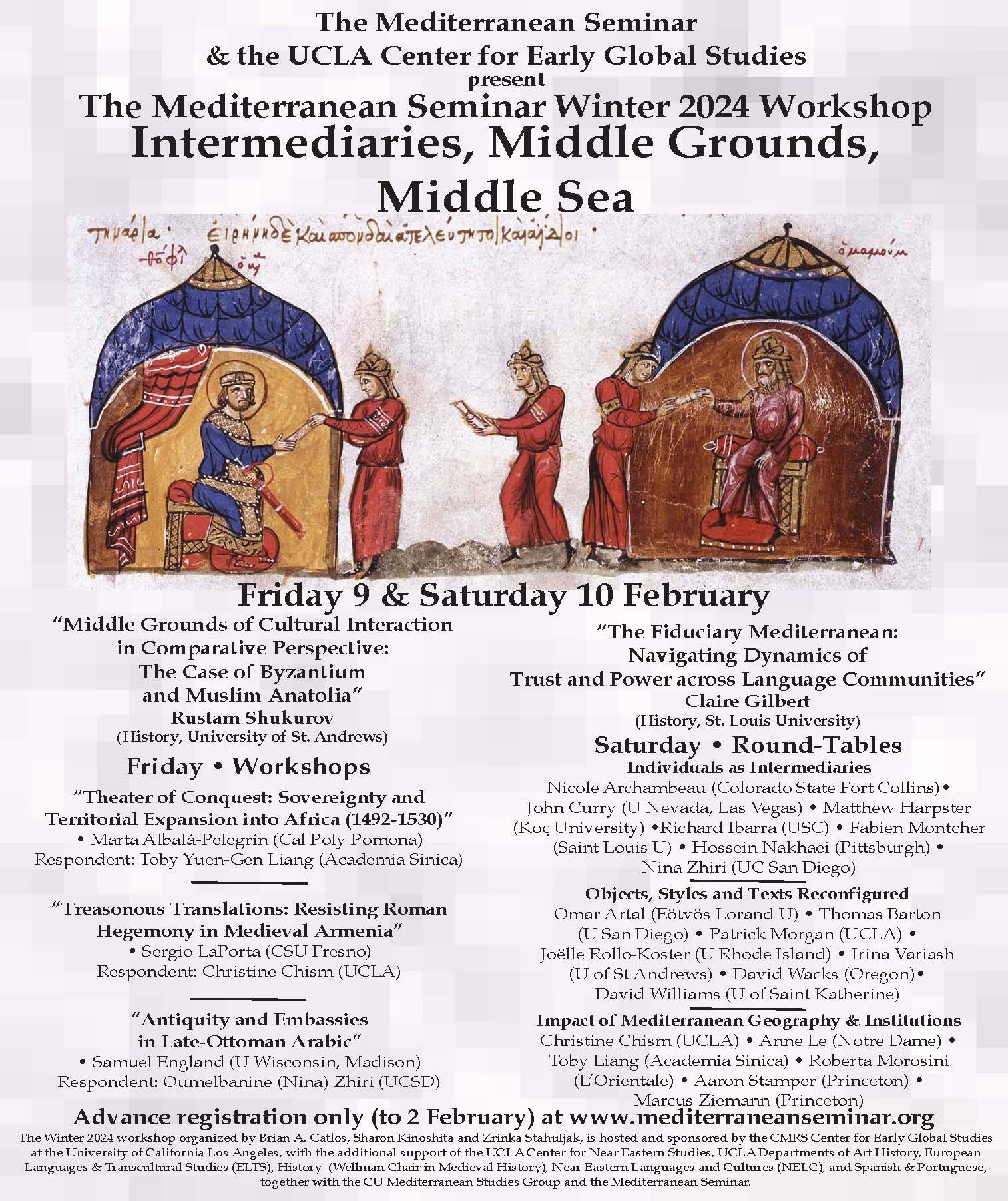MENUMENU

- This event has passed.
Attend: “Intermediaries, Middle Grounds, Middle Sea” Mediterranean Seminar 2024 Winter Workshop (9 & 10 February: UCLA)
Feb 9 @ 8:00 am - Feb 10 @ 5:00 pm

The Mediterranean Seminar and UCLA’s CMRS Center for Early Global Studies present the Mediterranean Seminar Winter 2024 Workshop, “Intermediaries, Middle Grounds, Middle Sea” held on 9 & 10 February at UCLA.
As the theater of engagement and integration of communities originating on the shores or from the hinterlands of Africa, Asia, and Europe, the Mediterranean region served as a dynamic center of interaction and exchange from Antiquity through early modernity. Even as it began to lose political and economic centrality, it has remained a zone of engagement of diverse peoples and cultures into the Modern era. This engagement is both the product and the catalyst of continuous dialectical processes of translation, transculturation, colonization, and syncretism across the gamut of human experience and expression: in art, literature, language, music, religion, media, material culture, and folk practices, as well as in social, economic, political, and institutional dynamics.
The Winter 2024 Mediterranean Seminar Workshop focuses on the agents (the “go-betweens”) and the currents (the “in-betweens”) of such dialectics. Typically invisible or, at best, marginalized in traditional historiographies and disciplines, intermediaries and middle grounds (synthetic texts, translations, objects, institutions and strategies, and the individuals and communities who were their agents and products) are crucial to the understanding of the history and culture of the Mediterranean, and of the historical processes which gave rise to many aspects of the modern world.
Draft Program (subject to change)
Friday 9 February
Workshop Paper #1“Theater of Conquest: Sovereignty and Territorial Expansion into Africa (1492-1530)” [abstract]• Marta Albalá-Pelegrín (Associate Professor of Modern Languages, Cal Poly Pomona)Moderator: Sharon Kinoshita (Literature: UC Santa Cruz)Respondent: Toby Yuen-Gen Liang (History & Philology, Academia Sinica, Taiwan)
Workshop Paper #2“Treasonous Translations: Resisting Roman Hegemony in Medieval Armenia”[abstract]• Sergio LaPorta (Associate Dean of Arts & Humanities, CSU Fresno)Moderator: Brian A. Catlos (Religious Studies: CU Boulder)Respondent: Christine Chism (English, UCLA)
Workshop Paper #3“Antiquity and Embassies in Late-Ottoman Arabic” [abstract]• Samuel England (Associate Professor of Arabic, University of Wisconsin, Madison)Moderator: Zrinka Stahuljak (Director, Center for Early Global Studies, UCLA)Respondent: Oumelbanine (Nina) Zhiri (Literature, UC San Diego)
Keynote Presentation:“Middle Grounds of Cultural Interaction in Comparative Perspective: The Case of Byzantium and Muslim Anatolia” [abstract]• Rustam Shukurov (University of St Andrews)Moderator: Brian A. Catlos (Religious Studies: CU Boulder)
Saturday 10 February
Keynote Presentation:“The Fiduciary Mediterranean: Navigating Dynamics of Trust and Power across Language Communities” [abstract]• Claire Gilbert (Saint Louis University)Moderator: Sharon Kinoshita (Literature: UC Santa Cruz)
Round Table 1To what extent did the individual character of intermediaries (go-betweens, diplomats, translators, fixers, exiles, refugees, enslaved people) shape cultural, political and/or economic developments in the Mediterranean? To what extent does this differ or resemble dynamics and apparatuses outside the region?Moderator: Brian A. Catlos (Religious Studies: CU Boulder)• Nicole Archambeau (History, Colorado State Fort Collins) [abstract]• John Curry (History, University of Nevada, Las Vegas) [abstract]• Matthew Harpster (Archaeology/Art History, Koç University) [abstract]• Fabien Montcher (History, Saint Louis University) [abstract]• Hossein Nakhaei (Art History, Pittsburgh University) [abstract]• Oumelbanine (Nina) Zhiri (Literature, UC San Diego) [abstract]
Round Table 2What do transmitted, borrowed, gifted or re-configured objects, styles, cultural forms or texts reveal about processes of cultural dialectic in the Mediterranean? To what extent are these dynamics particularly Mediterranean?Moderator: Sharon Kinoshita (Literature: UC Santa Cruz)• Omar Artal (School of Historical Science, Eötvös Lorand University, Budapest) [abstract]• Thomas Barton (History, University of San Diego) [abstract]• Patrick Morgan (History, UCLA) [abstract]• Joëlle Rollo-Koster (History, University of Rhode Island) [abstract]• Irina Variash (History, University of St Andrews) [abstract]• David Wacks (Romance Languages, Oregon) [abstract]• David Williams (Interdisciplinary Studies, University of Saint Katherine) [abstract]
Round Table 3How did the geographical character and/or institutional infrastructure that developed in the Mediterranean contribute to particular outcomes in terms of regional engagement and/or cultural, political and/or social evolution?Moderator: Zrinka Stahuljak (Director, Center for Early Global Studies, UCLA)• Christine Chism (English, UCLA) [abstract]• Anne Le (Medieval Institute, Notre Dame University) [abstract]• Toby Yuen-Gen Liang (History & Philology, Academia Sinica, Taiwan) [abstract]• Roberta Morosini (Italian, Università degli Studi di Napoli L’Orientale) [abstract]• Aaron Stamper (History, Princeton University) [abstract]• Marcus Ziemann (Classics, Princeton University) [abstract]
Attendance is for registered participants only.
Lunches are included for registered participants.
Registration is free, and is open until 2 February 2024, but please register as soon as possible as numbers are limited.
Registrees commit to attending the whole two-day event.
For general information see www.mediterraeneanseminar.org; for general inquiries, contact mailbox@mediterraneanseminar.org
We regret that travel support is not available for attendees.
Sponsors, Organization & Support:This workshop is organized by Brian A. Catlos, Sharon Kinoshita and Zrinka Stahuljak.The Winter 2024 workshop is hosted and sponsored by the CMRS Center for Early Global Studies at the University of California Los Angeles, together with the CU Mediterranean Studies Group and the Mediterranean Seminar.
